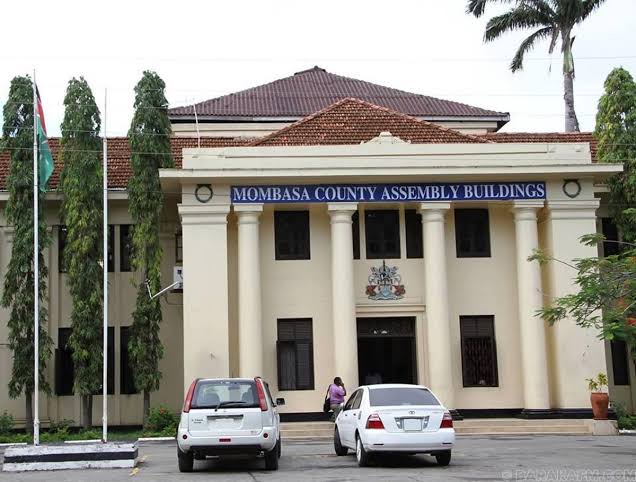Investigations
Mombasa MCAs Questions MOWASSCO’s Inefficiencies After Auditor General’s Theft Expose
The committee has ordered an immediate physical verification exercise to establish the true state of MOWASSCO’s assets, with a field inspection scheduled for June 30, 2025.

Financial irregularities, missing assets, and environmental violations plague Mombasa’s water utility company
MOMBASA – Members of the Mombasa County Assembly have launched a scathing attack on the Mombasa Water Supply and Sanitation Company Limited (MOWASSCO) following explosive revelations in the Auditor General’s report that exposed widespread financial irregularities and operational failures within the water utility.
The County Public Investments and Accounts Committee, led by Chairman Sylvester Kai, summoned MOWASSCO’s top management to explain damning findings in Auditor General Nancy Gathungu’s report for the financial year ending June 30, 2024.
The heated session, held at the Mombasa County Assembly premises, laid bare a company plagued by missing assets, questionable financial management, and environmental violations that have left residents without adequate water and sanitation services.
Missing Vehicles and Unaccounted Assets
At the heart of the controversy lies a glaring discrepancy in MOWASSCO’s asset reporting.
While the company claims to own 39 vehicles, the Auditor General’s independent verification found only 28 vehicles in existence – a difference of 11 missing vehicles that MOWASSCO has failed to account for.
“There is a lack of substantiating documents, and a detailed breakdown of outstanding liabilities is needed, including statutory deductions and arrears to Coast Water Supplies,” charged MCA Patrick Mbelle, highlighting the company’s inability to provide proper documentation for its claimed assets.
The committee has ordered an immediate physical verification exercise to establish the true state of MOWASSCO’s assets, with a field inspection scheduled for June 30, 2025.
The findings will form the basis of a comprehensive report that could trigger further investigations into potential asset misappropriation.
Financial Hemorrhaging and Operational Failures
The Auditor General’s report painted a picture of a company in financial distress, operating at a loss with negative working capital and mounting liabilities.
Despite introducing a debt recovery policy in 2023, MOWASSCO has failed to implement meaningful collection measures, including basic enforcement actions such as service disconnections for non-paying customers.
MOWASSCO management attributed their financial woes to inflation and rising operational costs, but legislators questioned why the company had not taken decisive action to address its deteriorating financial position.
The company’s failure to provide critical operational records, including the elusive Smart Water Metering contract that auditors repeatedly requested but never received, further raised red flags about transparency and accountability.
The financial mismanagement extends to pending statutory deductions and unpaid obligations to Coast Water Works, creating a web of liabilities that threatens the company’s operational sustainability.
With yearly deficits becoming the norm, MOWASSCO’s financial position has become increasingly precarious.
Environmental Crisis: Sewage Flowing into the Ocean
Beyond financial irregularities, MOWASSCO faces severe criticism for its environmental violations, particularly the continued discharge of untreated sewage into the Indian Ocean.
The Auditor General’s report revealed that the Kipevu Sewerage Plant remains idle while the Kizingo facility lies in ruins following vandalism.
These critical sanitation facilities were part of the ambitious Water and Sanitation Development Programme (WSDP), but their non-operational status has forced the company to resort to environmentally destructive practices that violate Kenya’s environmental regulations.
The committee expressed outrage over MOWASSCO’s failure to prioritize environmental compliance, calling for immediate collaboration with the National Environment Management Authority (NEMA) to address the sewage discharge crisis.
The environmental violations not only pose health risks to coastal communities but also threaten Mombasa’s tourism industry, which depends on clean beaches and marine ecosystems.
Promises and Delays
In response to the mounting criticism, MOWASSCO management promised that a comprehensive master plan is in progress, involving the acquisition of electromechanical equipment to rehabilitate the damaged facilities.
However, the company requested more time for internal consultations, a request that was met with skepticism from committee members who have heard similar promises before.
The committee’s patience appears to be wearing thin, with Chairman Kai demanding concrete action rather than more consultations.
The ordered documentation deadline of Tuesday, June 24, 2025, and the scheduled field inspection represent the assembly’s determination to get to the bottom of MOWASSCO’s operational failures.
The MOWASSCO scandal reflects broader challenges facing Kenya’s public utility companies, where weak governance structures, inadequate oversight, and poor financial management have become endemic.
The case highlights the critical role of the Auditor General’s office in exposing institutional failures and the importance of legislative oversight in ensuring accountability.
With Mombasa residents paying increased water tariffs while receiving substandard services, the MOWASSCO controversy underscores the urgent need for comprehensive reforms in Kenya’s water sector.
The company’s failure to provide reliable water supply and adequate sanitation services affects hundreds of thousands of residents in Kenya’s second-largest city.
The committee’s decision to conduct a physical verification exercise and compile a formal report signals that the MOWASSCO leadership may face serious consequences for the identified irregularities.
The June 30 field inspection will be crucial in determining whether criminal investigations or administrative actions will follow.
The case also raises questions about the effectiveness of existing oversight mechanisms and whether stronger penalties are needed to deter similar failures in other public utilities.
As residents continue to suffer from poor water and sanitation services while their money appears to be mismanaged, the pressure for accountability continues to mount.
The MOWASSCO scandal serves as a stark reminder that public utilities must be held to the highest standards of financial management and environmental compliance.
For Mombasa residents who deserve reliable water and sanitation services, the committee’s investigation represents a crucial step toward ensuring that public resources are used for their intended purpose rather than being diverted through financial irregularities and operational failures.
The coming weeks will reveal whether MOWASSCO can provide satisfactory explanations for the identified discrepancies or if the company will face more serious consequences for its apparent failures in stewardship of public resources and environmental responsibility.
This story is based on proceedings of the Mombasa County Assembly’s Public Investments and Accounts Committee and the Auditor General’s report for the financial year ending June 30, 2024.
Kenya Insights allows guest blogging, if you want to be published on Kenya’s most authoritative and accurate blog, have an expose, news TIPS, story angles, human interest stories, drop us an email on [email protected] or via Telegram
-

 News2 weeks ago
News2 weeks agoTHE FIRM IN THE DOCK: How Kaplan and Stratton Became the Most Scrutinised Law Firm in Kenya
-

 Economy2 weeks ago
Economy2 weeks agoIran Demands Arrest, Prosecution Of Kenya’s Cup of Joe Director Director Over Sh2.6 Billion Tea Fraud
-

 Grapevine1 week ago
Grapevine1 week agoA UN Director Based in Nairobi Was Deep in an Intimate Friendship With Epstein — He Even Sent Her a Sex Toy
-

 Business2 weeks ago
Business2 weeks agoKPC IPO Set To Flop Ahead Of Deadline, Here’s The Experts’ Take
-

 Politics2 weeks ago
Politics2 weeks agoPresident Ruto and Uhuru Reportedly Gets In A Heated Argument In A Closed-Door Meeting With Ethiopian PM Abiy Ahmed
-

 Investigations1 week ago
Investigations1 week agoHow Mexico Drug Lord’s Girlfriend Gave Him Away
-

 Business2 weeks ago
Business2 weeks agoSafaricom Faces Avalanche of Lawsuits Over Data Privacy as Acquitted Student Demands Sh200mn Compensation in 48 Hours
-

 Investigations2 weeks ago
Investigations2 weeks agoKenya’s DCI Opens Probe on Russian Man Who Secretly Filmed Sex Escapades With Women — But There’s a Slim Chance They’ll Ever Get Him

















